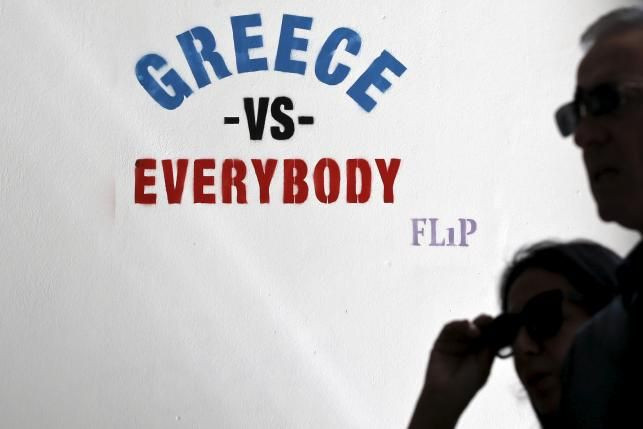Greeks Seek Debt Relief As EU Steps Up Warnings

Greek negotiators were expected to press the country's international creditors for debt relief on Sunday as Europe stepped up pressure on Athens to offer major concessions on austerity and reform or face dire consequences.
Neither side doubts the urgency of reaching a deal as Greece must repay 1.6 billion euros ($1.8 billion) to the International Monetary Fund by the end of this month or default, putting its future in the euro in grave danger.
Germany's Frankfurt Allgemeine Sonntagszeitung reported that European Commission President Jean-Claude Juncker had warned Prime Minister Alexis Tsipras about the risk of "Grexit" - a Greek exit from the currency bloc - when they met in Brussels last week.
Giving instructions to his negotiating team before it headed to Brussels, Prime Minister Alexis Tsipras has said he may accept bitter compromises on the creditors' demands, but signaled he wants a significant easing of Greece's huge debt burden in return.
A person familiar with the long-running negotiations between Athens and its creditors told Reuters that discussions were under way on the debt relief issue. He declined to say who was involved but acknowledged that Greece could not take on yet more debt without some kind of relief.
Athens faces immediate problems in repaying debts over the summer with money it does not have, as the European Union and IMF have not paid any money from Greece's 240 billion euro bailout programs since the middle of last year. On top of the IMF loan, it must also repay 6.7 billion euros when Greek bonds held by the European Central Bank fall due in July and August.
Even if this short-term hump can be overcome, Greece still faces the daunting prospect of eventually repaying the bailout loans, something that will hang over its enfeebled economy for decades unless a relief deal is achieved.
The Greek team, led by a deputy prime minister, Yannis Dragasakis, and chief negotiator Euclid Tsakalotos, is likely to take this up in a second day of talks on a Greek counter-proposal with EU officials in Brussels on Sunday.
"The ongoing talks are difficult. Positions are still far apart. It is not certain whether there will be an outcome. Senior Commission officials are worried whether an agreement can be reached on time," an EU official said.
Greece already gained significant relief when a large part of its debt held by private investors was written off in 2012. But any deal that involves writing off public debt is likely to provoke outrage among European taxpayers, who funded the bulk of the bailout loans.
That resistance is strongest in Germany, the biggest contributor to the two bailout programs since 2010, when Greece was forced out of international debt markets and slid deeper into a depression made yet worse by austerity policies imposed at the creditors' behest.
DEBT RELIEF NOT TABOO
Nevertheless, the debt relief topic is not taboo. "There is a conversation going on," the source familiar with the negotiations said, without saying at which level it was being conducted.
Creditors are pressing Greece to achieve a sizeable primary surplus on the state budget that excludes debt repayments. This would allow Athens to set aside funds to pay off loans in the future without having to borrow yet more from international lenders.
However, the leftist-led government wants lower surpluses to free up funds for helping Greeks who have suffered worst in the depression, during which the economy has shrunk by a quarter and unemployment has soared over 25 percent.
"There is a much larger financing need for the next several years than expected. So Greece will have to take on lots more debt. That’s inevitable if you have lower fiscal surpluses," the source said. "Greece does not have the capacity to take on more debt without some form of relief."
Such a deal need not necessarily involve writing down the value of the debt, something that German Chancellor Angela Merkel would be unlikely to accept. Merely pushing repayment periods into the future might do the trick.
"Extending maturities would do for many years. It's a perfectly economically reasonable way of making this manageable," the source said.
EU officials question Greek assertions that the debt is asphyxiating the economy as Athens does not have to start repaying the bailout loans until 2023. The debt is accruing interest, meaning that it will grow over the next eight years, but the annual rate is below what Italy pays and in any case the interest payments also begin only in 2023.
Nevertheless, Tsipras appears to be seeking a gesture on debt from Europe that will allow him to sell a harsh deal to his radical left Syriza party and Greek voters.
Finance Minister Yanis Varoufakis has proposed a debt swap involving the ESM, Europe's bailout mechanism, to help Athens meet the ECB repayments over the summer.
While the debate goes on, the clock ticks. "Time is not on our side," European Commission Vice President Valdis Dombrovskis told Germany's Die Welt newspaper. "We need a deal in the next few days."
(Additional reporting by Paul Taylor; Writing by David Stamp; Editing by Alison Williams)
© Copyright Thomson Reuters 2024. All rights reserved.





















